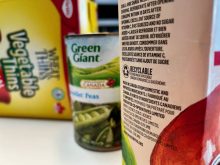On May long weekend, St. Norbert opened its outdoor market to the least fanfare in recent memory.
Market co-ordinators had prepared to limit shoppers, but that proved not to be necessary. According to a Facebook post, they never reached capacity as crowd-leery folks stayed away.
While the physical market continues to operate, more and more vendors have joined the online market, in which people can buy locally made food and goods and pick it up through a drive-thru. By all appearances, people have taken to it. The market has posted pictures on social media of tables lined up with pre-packed orders.
Read Also

Use-it-up meals stretch the post-holiday menu
Leftovers and extra food abound in the first weeks of January. Give your kitchen a winter reset, clean out the fridge and save on your grocery bill
Since the start of the COVID-19 pandemic, more people seem willing to shop for food online.
About five per cent of Canadians switched to buying groceries online since the beginning of the pandemic, according to a May 4 report from Dalhousie University. While this seems like a small percentage, it represents a tripling from pre-COVID days.
In an April 21 article, Forbes reported a 129 per cent increase in U.S. and Canadian e-commerce orders from last year, and an overall 146 per cent growth in all online, retail orders.
Food industry experts have predicted that an increase in e-commerce will be one of the permanent changes to the food system after COVID-19 passes.

“I think that’s going to be a huge issue,” said Evan Fraser, head of the Arrell Food Institute at the University of Guelph.
He added that retailers have been trying to figure out online grocery shopping for years, and now have been forced into action. He predicted retailers will invest big in e-commerce platforms.
“There is a new reality and we are overcoming some of those challenges,” said McCain Canada president Danielle Barran during a webinar with the Canadian Club Toronto on May 7.
Previously, Canada’s large size and relatively small population has made delivery costs a challenge, she said. Now the industry is seeing that e-commerce can work in Canada and will likely increase.
“Now it’s up to the industry to figure out how to get cost out of the system so it can sustain,” Barran said.
E-commerce allows for more potential choice than just a few big retailers, said Sylvain Charlebois, senior director of Agri-Food Analytics Lab, and professor in food distribution policy at Dalhousie University.
“E-commerce is basically bringing more democracy to the system,” Charlebois said.
A move to online shopping has made more room for small food producers.
Online sales combined with fears over meat shortages have allowed Michelle Shram and Troy Stozek to vastly increase sales of their grass-fed beef and lamb.
Shram and Stozek, who farm near Cartwright, Manitoba, list meat products on their website and deliver once a month to Winnipeg. Pre-pandemic, if they sold out at all, it was in the last few days of the ordering window. When they spoke to the Co-operator on May 4, they were already sold out within their first week and a half of listing.

New customers have found them by word of mouth, online, and through Direct Farm Manitoba, which lists local food sellers on its website.
At one time it was strange to order groceries online and wait in a parking lot to pick them up, Shram said. Now people are forced to stand in line to get into a ‘regular’ grocery store.
In April, the province and the federal government teamed up to provide $160,000 to Direct Farm Manitoba, in part to purchase an e-commerce platform that would allow the organization to move farmers’ markets and food sellers online quickly.
On May 1, Winnipeg Mayor Brian Bowman gave Direct Farm Manitoba official permission to use city properties like community centres as “food hubs” — points to meet customers and deliver pre-ordered food.

While this was essentially official recognition of what was already happening, Direct Farm Manitoba president Phil Veldhuis explained, it was validation for a group that has often felt the need to prove its legitimacy.
“I think it’s pretty awesome that they recognize that this sort of, kind of weird, kind of obscure farm exchange is actually important and necessary,” Veldhuis told the Co-operator.
Disruption driven
Lately interruptions to supply chains appear to have increased interest in direct sales.
Given halts to cattle processing due to COVID-19 outbreaks among workers at packing plants, the association said it wants to facilitate beef sales straight off the farm as a way to help ranchers and make product available to consumers.
As news broke of disruptions at packing plants in early May, the Saskatchewan Stock Growers Association moved to facilitate direct beef sales among its members, according to a report from the Western Producer.
“When consumers buy their beef from the farm gate, they’re getting great value while helping out their local farmers and ranchers,” SSGA president Bill Huber said in a news release. “People like to know where their food comes from and this is a great opportunity for consumers to meet the people who produce the top-quality beef Saskatchewan is famous for.”
Fraser predicted there will be a strong, renewed interest among some consumers for buying local food and supporting shorter supply chains.
“My guess is that there will be a sustained increase in consumers wanting to support the local farm community through things like CSA-type models, and that will be enabled by better technology,” he said.
Big sellers?
While local food sellers may increase their market share, that market share is still small and it needs to work alongside the large-scale agri-food industry.

“What we seem to forget is the efficiency of the system itself,” said Charlebois. “Canadians have actually had access to a very affordable food basket for several years.”
The large-scale food chain probably won’t shorten much, said Fraser.
Fraser suggested that instead of shortening supply chains, large companies might move toward greater transparency in those chains.
He referenced companies like Grain Discover, which uses blockchain technology to track grain from the field, through the supply chain to the store.
Tracking food like this effectively creates a map of the supply chain, said Fraser. It allows companies to pinpoint weaknesses in the chain and make contingency plans.
“Unless you’ve actually got that map, you don’t know where the roadblocks might be, you don’t know where the bottlenecks might be, you don’t know where the alternative routes might be.”
The agri-food system also needs better strategy, said Charlebois. The stresses of the pandemic are an opportunity to think differently.
“I think we need to recognize that the centrepiece for any agri-food processing strategy has to be processing and then you start from there,” said Charlebois.
Each commodity can think differently about how to structure and give itself more options, he said. For instance, dairy could divert excess stock to making biodiesel or biogases, said Charlebois. Milk can also be used to make vodka.
“We haven’t been innovative enough,” he said.


















